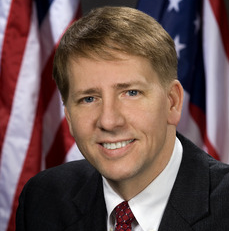 BLOG VIEW: The good news is that the election of 2012 is now safely tucked into the history books. The bad news is that election of 2014 is prowling about like a burglar surveying a house to rob.
BLOG VIEW: The good news is that the election of 2012 is now safely tucked into the history books. The bad news is that election of 2014 is prowling about like a burglar surveying a house to rob.
Among the politicians eyeballing 2014 is a name that should be very familiar to mortgage bankers: Richard Cordray, the director of the Consumer Financial Protection Bureau (CFPB). Cordray used to be attorney general of Ohio until Buckeye State voters kicked him out of office in 2010. Today, rumors are circulating around Ohio that Cordray is planning to return and run for governor.
If Cordray is going to run for governor, he can be satisfied in knowing that most Ohioans will not respond to his efforts by saying, ‘Who's that guy?’ A July survey conducted by Public Policy Polling found that Cordray has a 38% name recognition in the state and that he trailed the Republican incumbent, Gov. John Kasich, by a single point if they were to duel for office.
Of course, one doesn't just jump into an expensive political race with barely a thought of costs and consequences. Perhaps this might explain why Cordray has spent the past year making himself into one the most provocative and high-decibel bureaucrats in Washington. Indeed, not since Andrew Cuomo turned the U.S. Department of Housing and Urban Development into his personal publicity firm in the 1990s has there been a federal official that has gone out of his way to call attention to himself in the media.
In press release after press release and speech after speech, Cordray has used absurdist overkill language to expound a level of zealotry that bears little resemblance to the duties of the CFPB, let alone the basic duties of a federal regulator. Of course, servicers will remember his arrogant sneer about how the CFPB would ‘put the service back in servicing’ or his provocative claim that ‘inadequate performance of many mortgage servicers has helped widen the misery for many Americans.’ (Never mind that the misery was self-inflicted by homeowners that didn't pay their mortgages – the basic concept of personal responsibility by consumers is alien to Cordray and his lieutenants.)
Last month, in announcing the first of the CFPB's Supervisory Highlights reports, Cordray used the agency's press office to declare his ‘continued commitment to making sure that institutions are following the law.’ I'm sorry, but is there a hitherto undisclosed wave of financial institutions that are not following the law? I don't recall the last time that the C-suite occupants of any financial services institution were arrested for ‘not following the law.’ Indeed, even President Obama has acknowledged that the U.S. Department of Justice under Attorney General Eric Holder has been unable to find evidence that the financial services executives at the center of the 2008 crash broke the law.
None of the other federal agencies responsible for regulating the financial services industry is using Cordray's toxic language or demented scenarios to characterize the relationship between lenders and borrowers. Even federal law enforcement entities that bring civil suits against financial services providers have made it very clear their focus is against individual (and, often, isolated) acts of disreputable behavior.
And, for that matter, none of the other leaders of the regulatory agencies have sought to follow in Cordray's level of media spotlight hogging. Federal Reserve Chairman Ben Bernanke, for example, has actively sought to demystify his office through a series of low-key, straight-talk encounters with the media and public – he certainly has not encouraged the cult of personality that surrounded previous Fed leaders, most egregiously Alan Greenspan. And the most important force in today's federal housing finance environment, Edward DeMarco of the Federal Housing Finance Agency, has become something of an anti-Cordray by going out of his way to avoid media attention.
If one gazes at the U.S. through Cordray's CFPB viewfinder, mortgage bankers are nothing more than mustache-twirling villains, and homeowners are helpless innocents in desperate need of rescuing by big ol' Uncle Sam. All of this utter nonsense, obviously, but many politicians believe this brand of sawdust melodrama helps to build reputations and generate votes.
If Cordray is serious about running for governor of Ohio, he would obviously have to start putting the machinery and manpower in place now in order to be ready for a full-throttle campaign. Running for office is a full-time endeavor that, ultimately, eats up anyone's schedule.Â
But is Cordray going to commit himself to run for governor of Ohio? For someone who has repeatedly demanded transparency from the financial services industry, Cordray is curiously not providing any transparency regarding his own political near future. Cordray's term as CFPB director expires at the end of next year and, in view of the controversy surrounding his Jan. 4 recess appointment by President Obama, it is impossible to imagine that the partisan-divided Congress would ever consider granting him a formal confirmation hearing for a second term.
So allow me to publicly ask Cordray the easiest question imaginable: Can you please give us a simple yes-or-no answer on whether you're planning to run for governor of Ohio in 2014? If you are, then good luck and more power to you – but, please, stop using the taxpayer-funded CFPB to call attention to yourself!
– Phil Hall, editor, MortgageOrb
(Please address all comments regarding this opinion column to hallp@mortgageorb.com.)













